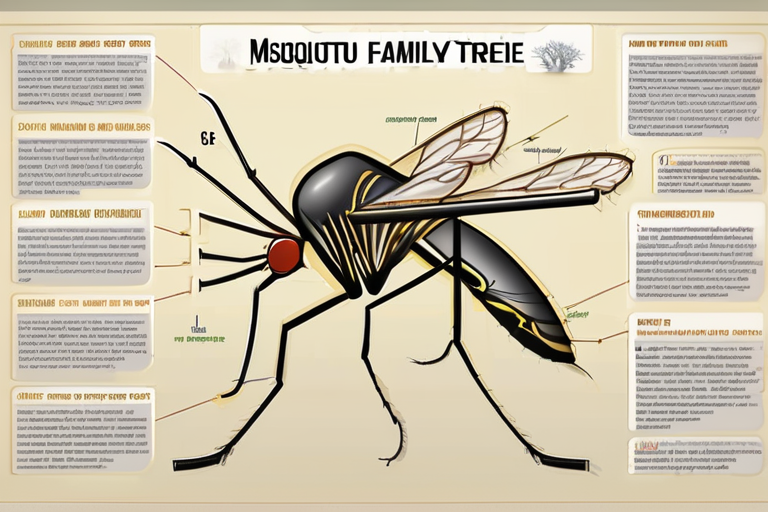Mosquito Family Tree Revised: Insects Evolved 100 Million Years Younger Than Thought
A groundbreaking study published in the journal Nature has reevaluated the evolutionary history of mosquitoes, revealing that they emerged around 25 million years later than previously believed. According to researchers, modern mosquito species evolved approximately 125 million years ago, during the Cretaceous period.
The discovery was made possible by the analysis of a well-preserved fossilized insect trapped in amber, which dated back to around 125 million years ago. The fossil, found in Myanmar, showed striking similarities with modern mosquitoes, leading scientists to conclude that it is an ancestor of the modern species.
"We were surprised to find that this ancient mosquito-like insect was so similar to its modern counterparts," said Dr. Marc Deville, lead author of the study. "This finding has significant implications for our understanding of the evolution of mosquitoes and their role in transmitting diseases."
The revised timeline suggests that the ancestors of modern mosquitoes emerged around the same time as the predecessors of Plasmodium, a genus that includes parasites responsible for causing malaria. This coincidence raises questions about the potential co-evolution of mosquitoes and their disease-causing counterparts.
According to Dr. Deville, "This study highlights the importance of reevaluating our understanding of evolutionary history using new technologies and methodologies." The research team employed advanced computational methods and machine learning algorithms to analyze the fossil data, providing a more accurate picture of mosquito evolution.
The findings have significant implications for public health, as mosquitoes are vectors for various diseases, including malaria, dengue fever, and Zika virus. Understanding their evolutionary history can inform strategies for disease prevention and control.
"This study demonstrates the power of interdisciplinary research in advancing our knowledge of the natural world," said Dr. Pierce, a co-author of the study. "By combining paleontology, computational biology, and machine learning, we were able to shed new light on the evolution of mosquitoes."
The study's results have sparked interest among scientists and policymakers alike, with many calling for further research into the evolutionary history of mosquitoes and their role in disease transmission.
As researchers continue to explore the intricacies of mosquito evolution, they may uncover new insights into the complex relationships between these insects and the diseases they transmit. The revised timeline has opened up new avenues for investigation, promising a deeper understanding of one of humanity's most ancient and persistent foes: the mosquito.
Background
Mosquitoes have been a subject of interest for scientists and public health officials due to their role in transmitting diseases that affect millions worldwide. Understanding their evolutionary history can provide valuable insights into their behavior, ecology, and interactions with other organisms.
Additional Perspectives
Dr. Deville noted that the study's findings have significant implications for our understanding of co-evolutionary processes between mosquitoes and their disease-causing counterparts. "This study highlights the importance of considering the complex relationships between species in shaping evolutionary outcomes," he said.
The revised timeline has also sparked interest among paleontologists, who are eager to explore new fossil discoveries that can shed light on the evolution of ancient organisms.
Current Status and Next Developments
As researchers continue to analyze the fossil data and refine their computational methods, they may uncover new insights into the evolutionary history of mosquitoes. The study's findings have sparked a renewed interest in understanding the complex relationships between mosquitoes and the diseases they transmit, with many calling for further research into this critical area.
The study's authors are now working on applying these new insights to inform disease prevention and control strategies, highlighting the potential for interdisciplinary research to drive meaningful change in public health.
*Reporting by Nature.*



 Hoppi
Hoppi

 Hoppi
Hoppi

 Hoppi
Hoppi

 Hoppi
Hoppi

 Hoppi
Hoppi

 Hoppi
Hoppi











